51.2.5.6 (51 > 10)
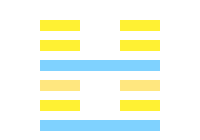
51.2.5.6 (51 > 10) - THE KĂN HEXAGRAM.
- 2. The second line, divided, shows its subject, when the movement approaches, in a position of peril. He judges it better to let go the articles (in his possession), and to ascend a very lofty height. There is no occasion for him to pursue after (the things he has let go) ; in seven days he will find them.
- 5. The fifth line, divided, shows its subject going and coming amidst the startling movements (of the time), and always in peril ; but perhaps he will not incur loss, and find business (which he can accomplish).
- 6. The topmost line, divided, shows its subject, amidst the startling movements (of the time), in breathless dismay and looking round him with trembling apprehension. If he take action, there will be evil. If, while the startling movements have not reached his own person and his neighbourhood, (he were to take precautions), there would be no error, though his relatives might (still) speak against him.
51.2.5.6 (51 > 10) - Shock
One takes leave of those with whom one has shared suffering.
Bing DeepL Google Yandex51.2.5.6 (51 > 10) - Shock
One takes leave of those with whom one has shared suffering.
Bing DeepL Google Yandex51.2.5.6 (51 > 10) - Kán, l’ébranlement
Kán : tonnerre, effroi répandu, crainte.
- 2. Quand le tonnerre gronde, le danger arrive, on croit devoir tout abandonner et se retirer en un lieu sûr et élevé. Qu’on ne s’obstine pas à rechercher alors ce qu’on a abandonné ; on le retrouvera quelque temps après. (Quand le danger sera passé.)
- 5. Le tonnerre allant et venant répand l’effroi ; mais on doit tâcher de ne pas abandonner les affaires entreprises. Même dans le danger pressant, on doit garder le milieu.
-
6. Le tonnerre répand l’effroi et fait partout regarder avec trouble et crainte. S’il atteint et frappe, il causera un grand mal. (Ou : il corrige le mal.) Mais s’il ne frappe ni tel personnage, ni ses voisins, ce ne sera point un mal et fera seulement jaser les habitants d’une même maison.
Quand le tonnerre gronde, que l’orage éclate, le sage recherche la cause de ce fait (et tâche de profiter de l’avertissement céleste).
51.2.5.6 (51 > 10) - Le choc
On prend congé de ceux avec qui on a partagé des souffrances.
Bing DeepL Google Yandex51.2.5.6 (51 > 10) - Megrázkódtatás
- 2. Ne keresse ami elveszett.
- 5. Szilárdan áll a megrázkódtatás kezdetekor és végigkíséri a többieket míg véget nem ér.
- 6. Elvesztette a leggyengébbet, visszafogottnak kell maradnia míg nem változnak.
Les trigrammes
Les trigrammes sont des combinaisons de trois traits yin et yang. Dans l'hexagramme, les trois traits du dessous constituent le trigramme inférieur et représentent la situation intérieure. Les trois lignes du haut constituent le trigramme supérieur et représentent la situation extérieure.
Trigramme supérieur : Le tonnerre Le ciel


Trigramme inférieur : Le tonnerre Le lac


La formation: 51
What is already there

51 - THE KĂN HEXAGRAM.
Kăn gives the intimation of ease and development. When (the time of) movement (which it indicates) comes, (the subject of the hexagram) will be found looking out with apprehension, and yet smiling and talking cheerfully. When the movement (like a crash of thunder) terrifies all within a hundred lî, he will be (like the sincere worshipper) who is not (startled into) letting go his ladle and (cup of) sacrificial spirits.
Bing DeepL Google Yandex51 - Shock
Something is coming which enables the identification of a problem.
Bing DeepL Google Yandex51 - Shock
Something is coming which enables the identification of a problem.
Bing DeepL Google Yandex51 - Kán, l’ébranlement
Kán : tonnerre, effroi répandu, crainte.
Kán« tonnerre, effroi se répandant, appréhension ». Le tonnerre survenant répand l’effroi ; par l’effroi, les rires et les causeries s’arrêtent court. Le tonnerre terrifie cent lis, mais ne doit pas arrêter la cuiller du sacrifice aux esprits (le sacrifice) 1.
1 Le tonnerre peut arrêter tout mais pas empêcher le sacrifice.
Texte
Le tonnerre approchant répand l’effroi ; les rires, les causeries s’arrêtent subitement. Le tonnerre terrifie cent lis, mais ne doit pas arrêter la cuiller du sacrifice aux esprits.
Commentaire
Cet effroi a d’heureux résultats. Les rires et les causeries gardent ainsi la mesure. Le tonnerre terrifie ce qui est loin comme ce qui est près. Mais on doit, quand même, garder le temple des ancêtres, les autels des génies du sol et présider aux sacrifices. (Malgré l’effroi, on ne peut les interrompre.)
Symbolisme
Le tonnerre répété forme l’hexagramme. Le sage, plein de crainte et de scrupules prudents, observe et corrige.
51 - Megrázkódtatás
Valami közelít ami lehetővé teszi a probléma felismerését.
Bing DeepL Google Yandex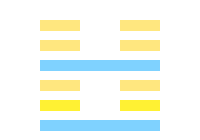
51.2 (51 > 54) - THE KĂN HEXAGRAM.
The second line, divided, shows its subject, when the movement approaches, in a position of peril. He judges it better to let go the articles (in his possession), and to ascend a very lofty height. There is no occasion for him to pursue after (the things he has let go) ; in seven days he will find them.
Bing DeepL Google Yandex51.2 (51 > 54) - Kán, l’ébranlement
Kán : tonnerre, effroi répandu, crainte.
Quand le tonnerre gronde, le danger arrive, on croit devoir tout abandonner et se retirer en un lieu sûr et élevé. Qu’on ne s’obstine pas à rechercher alors ce qu’on a abandonné ; on le retrouvera quelque temps après. (Quand le danger sera passé.)
Bing DeepL Google Yandex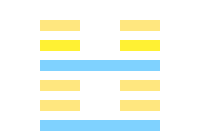
51.5 (51 > 17) - THE KĂN HEXAGRAM.
The fifth line, divided, shows its subject going and coming amidst the startling movements (of the time), and always in peril ; but perhaps he will not incur loss, and find business (which he can accomplish).
Bing DeepL Google Yandex51.5 (51 > 17) - Getting pushed around
One holds firm when the tremors begin, accompanies the others and endures them until they stop.
Bing DeepL Google Yandex51.5 (51 > 17) - Getting pushed around
One holds firm when the tremors begin, accompanies the others and endures them until they stop.
Bing DeepL Google Yandex51.5 (51 > 17) - Kán, l’ébranlement
Kán : tonnerre, effroi répandu, crainte.
Le tonnerre allant et venant répand l’effroi ; mais on doit tâcher de ne pas abandonner les affaires entreprises. Même dans le danger pressant, on doit garder le milieu.
Bing DeepL Google Yandex51.5 (51 > 17) - Se faire bousculer
On se tient fermement quand les secousses commencent, on accompagne les autres et on les endure jusqu'à ce qu'elles cessent.
Bing DeepL Google Yandex51.5 (51 > 17) - Megrázkódtatás
Szilárdan áll a megrázkódtatás kezdetekor és végigkíséri a többieket míg véget nem ér.
Bing DeepL Google Yandex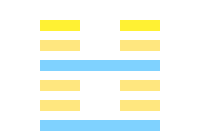
51.6 (51 > 21) - THE KĂN HEXAGRAM.
The topmost line, divided, shows its subject, amidst the startling movements (of the time), in breathless dismay and looking round him with trembling apprehension. If he take action, there will be evil. If, while the startling movements have not reached his own person and his neighbourhood, (he were to take precautions), there would be no error, though his relatives might (still) speak against him.
Bing DeepL Google Yandex51.6 (51 > 21) - Taking refuge in the heights
One has lost the weakest, so one keeps a low profile until they change.
Bing DeepL Google Yandex51.6 (51 > 21) - Taking refuge in the heights
One has lost the weakest, so one keeps a low profile until they change.
Bing DeepL Google Yandex51.6 (51 > 21) - Kán, l’ébranlement
Kán : tonnerre, effroi répandu, crainte.
Le tonnerre répand l’effroi et fait partout regarder avec trouble et crainte. S’il atteint et frappe, il causera un grand mal. (Ou : il corrige le mal.) Mais s’il ne frappe ni tel personnage, ni ses voisins, ce ne sera point un mal et fera seulement jaser les habitants d’une même maison.
Quand le tonnerre gronde, que l’orage éclate, le sage recherche la cause de ce fait (et tâche de profiter de l’avertissement céleste).
51.6 (51 > 21) - Se réfugier dans les hauteurs
On a perdu les plus faibles alors on reste discret jusqu'à ce qu'ils changent.
Bing DeepL Google Yandex51.6 (51 > 21) - Megrázkódtatás
Elvesztette a leggyengébbet, visszafogottnak kell maradnia míg nem változnak.
Bing DeepL Google YandexEn préparation : 10
Ce qui est en passe d'arriver

10 - THE LÎ HEXAGRAM.
(Lî suggests the idea of) one treading on the tail of a tiger, which does not bite him. There will be progress and success.
Bing DeepL Google Yandex10 - Continuity
One is committed with confidence, in the long term and with a simple goal, without looking for outside help.
Bing DeepL Google Yandex10 - Continuity
One is committed with confidence, in the long term and with a simple goal, without looking for outside help.
Bing DeepL Google Yandex10 - Li, la façon de procéder
Li : Marcher sur, se conduire, agir, suivre un chemin.
Texte
L’homme qui sait marcher sur la queue d’un tigre sans le faire crier réussira.
Commentaire, Symbolisme
Ciel au-dessus d’une eau stagnante. C’est la faiblesse, la douceur soumise marchant sur la force ; la joie répondant à la force. C’est le fort juste et modéré occupant la dignité souveraine ; exempt de faute, il est glorieux et brillant. Le grand et sage distingue le haut et le bas et donne satisfaction assurée aux désirs du peuple.
10 - La permanence
On s'engage avec confiance, dans la durée et avec un objectif simple, sans chercher d'aide au dehors.
Bing DeepL Google Yandex10 - Tartósság
Bizalommal elkötelezett, hosszútávon egyszerű célt követve, nem várva külső segítséget.
Bing DeepL Google YandexL'hexagramme nucléaire : 39.1.6 (39 > 37)
L'hexagramme nucléaire est l'association des deux trigrammes intérieurs (traits 2,3,4 et 3,4,5). Il représente la racine, ou l'origine de la situation.

39.1.6 (39 > 37) - THE KIEN HEXAGRAM.
- 1. From the first line, divided, we learn that advance (on the part of its subject) will lead to (greater) difficulties, while remaining stationary will afford ground for praise.
- 6. The topmost line, divided, shows its subject going forward (only to increase) the difficulties, while his remaining stationary will be (productive of) great (merit). There will be good fortune, and it will be advantageous to meet with the great man.
39.1.6 (39 > 37) - Placing on a pedestal
One pays great attention to a single person and treats them with the utmost deference.
Bing DeepL Google Yandex39.1.6 (39 > 37) - Placing on a pedestal
One pays great attention to a single person and treats them with the utmost deference.
Bing DeepL Google Yandex39.1.6 (39 > 37) - Kién, l’obstacle
Kién : Difficulté, danger, noble hardiesse.
-
1. Si l’on va (courageusement) aux choses difficiles, on reviendra comblé de louanges.
Il convient d’être ferme. -
6. Un autre y va également et revient plus éclairé et intelligent.
Il a la juste mesure.
Un dernier y va de même et revient plein de mérite et de succès. Il atteint les qualités du grand homme.
39.1.6 (39 > 37) - Mettre sur un piédestal
On fait très attention à une personne unique que l'on traite avec la plus grande déférence.
Bing DeepL Google Yandex39.1.6 (39 > 37) - Bizonytalanság
- 1. Mások ellenállnak mert nem ellenőrizte, így közvetítőt kér hogy felülvizsgálják a munkáját.
- 6. Kéri eltávolodott barátait hogy térjenek vissza.
Guide
La situation de départ

51.6 (51 > 21) - THE KĂN HEXAGRAM.
The topmost line, divided, shows its subject, amidst the startling movements (of the time), in breathless dismay and looking round him with trembling apprehension. If he take action, there will be evil. If, while the startling movements have not reached his own person and his neighbourhood, (he were to take precautions), there would be no error, though his relatives might (still) speak against him.
Bing DeepL Google Yandex51.6 (51 > 21) - Taking refuge in the heights
One has lost the weakest, so one keeps a low profile until they change.
Bing DeepL Google Yandex51.6 (51 > 21) - Taking refuge in the heights
One has lost the weakest, so one keeps a low profile until they change.
Bing DeepL Google Yandex51.6 (51 > 21) - Kán, l’ébranlement
Kán : tonnerre, effroi répandu, crainte.
Le tonnerre répand l’effroi et fait partout regarder avec trouble et crainte. S’il atteint et frappe, il causera un grand mal. (Ou : il corrige le mal.) Mais s’il ne frappe ni tel personnage, ni ses voisins, ce ne sera point un mal et fera seulement jaser les habitants d’une même maison.
Quand le tonnerre gronde, que l’orage éclate, le sage recherche la cause de ce fait (et tâche de profiter de l’avertissement céleste).
51.6 (51 > 21) - Se réfugier dans les hauteurs
On a perdu les plus faibles alors on reste discret jusqu'à ce qu'ils changent.
Bing DeepL Google Yandex51.6 (51 > 21) - Megrázkódtatás
Elvesztette a leggyengébbet, visszafogottnak kell maradnia míg nem változnak.
Bing DeepL Google YandexCorrection
La direction suivant laquelle le guide va plier
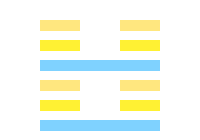
51.2.5 (51 > 58) - THE KĂN HEXAGRAM.
- 2. The second line, divided, shows its subject, when the movement approaches, in a position of peril. He judges it better to let go the articles (in his possession), and to ascend a very lofty height. There is no occasion for him to pursue after (the things he has let go) ; in seven days he will find them.
- 5. The fifth line, divided, shows its subject going and coming amidst the startling movements (of the time), and always in peril ; but perhaps he will not incur loss, and find business (which he can accomplish).
51.2.5 (51 > 58) - Shock
One professes to anyone who wants to hear it that one must not look guilty in order not to be chucked away.
Bing DeepL Google Yandex51.2.5 (51 > 58) - Shock
One professes to anyone who wants to hear it that one must not look guilty in order not to be chucked away.
Bing DeepL Google Yandex51.2.5 (51 > 58) - Kán, l’ébranlement
Kán : tonnerre, effroi répandu, crainte.
- 2. Quand le tonnerre gronde, le danger arrive, on croit devoir tout abandonner et se retirer en un lieu sûr et élevé. Qu’on ne s’obstine pas à rechercher alors ce qu’on a abandonné ; on le retrouvera quelque temps après. (Quand le danger sera passé.)
- 5. Le tonnerre allant et venant répand l’effroi ; mais on doit tâcher de ne pas abandonner les affaires entreprises. Même dans le danger pressant, on doit garder le milieu.
51.2.5 (51 > 58) - Le choc
On professe à qui veut l'entendre qu'il ne faut pas avoir l'air coupable pour ne pas être mis au rancart.
Bing DeepL Google Yandex51.2.5 (51 > 58) - Megrázkódtatás
- 2. Ne keresse ami elveszett.
- 5. Szilárdan áll a megrázkódtatás kezdetekor és végigkíséri a többieket míg véget nem ér.
Forum
Avez-vous besoin d'aide pour comprendre ce tirage ?
Rejoignez le forum et demandez de l'aide.
BBCode
Le BBCode ci-dessous est à votre disposition pour être copié-collé dans votre fil de discussion.
Link
Lien vers ce tirage

